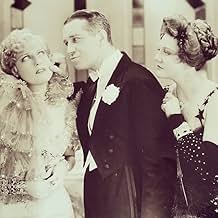NOTE IMDb
7,2/10
3,4 k
MA NOTE
Lorsque la principale contribuable d'un petit royaume part pour Paris, son roi envoie un fringant comte pour regagner son allégeance.Lorsque la principale contribuable d'un petit royaume part pour Paris, son roi envoie un fringant comte pour regagner son allégeance.Lorsque la principale contribuable d'un petit royaume part pour Paris, son roi envoie un fringant comte pour regagner son allégeance.
- Récompensé par 1 Oscar
- 1 victoire au total
Louis Adlon
- Wide Eyed Admirer
- (non crédité)
Histoire
Le saviez-vous
- AnecdotesDuring a recent showing on TCM, it was stated that Jeanette MacDonald and Maurice Chevalier did not get along on this film. He called her a "prude" and she called him "a bottom pincher". Their relationship had been deteriorating for some time, and this was the last film they appeared in together.
- GaffesWhen Sonia tears off a calendar sheet, it reads "Thursday, May III, 1885". However, May 3, 1885 was actually a Sunday.
- Versions alternativesA French version of this film, also starring Maurice Chevalier and Jeanette MacDonald, was filmed at the same time as this one.
- ConnexionsFeatured in Monsieur Cinéma: Épisode datant du 23 janvier 1972 (1972)
- Bandes originalesGirls, Girls, Girls
by Franz Lehár
Commentaire à la une
The Monarch of Marshovia sends a romantic count to Paris to woo back THE MERRY WIDOW whose vast wealth is vital to running the tiny kingdom.
Nine years after producing a non-talking film based on the Franz Lehár operetta, MGM mined the same material again, this time as a musical comedy. The Studio would give the film its trademark opulent treatment, with production values of the highest order. Celebrated lyricist Lorenz Hart was engaged to write words for the music. And, to make absolutely certain of success, director Ernst Lubitsch and stars Maurice Chevalier & Jeanette MacDonald were reunited to duplicate their previous triumphs at Paramount Studios.
If, ultimately, the film does not have quite the effervescence of Lubitsch's previous pictures, this is probably understandable. MGM, while wonderful with epics and dramas, often took an unnecessarily heavy-handed approach to subjects which should have been given a lighter, airier treatment. Also, the film was released a few months after the imposition of the Production Code, which obviously had a significant effect upon the movie's final persona.
Chevalier & MacDonald continue the on screen relationship already well established in their earlier films: she, the rather aloof and powerful female who needs a good man; he, the social inferior who wins her with his enormous Gallic charm. Their singing is vivacious & charming and sometimes you can almost understand her words.
Unlike the 1925 version of THE MERRY WIDOW, there is no villain here to provide dramatic tension. The costars, however, provide much comic amusement. Foremost among them is waspish Edward Everett Horton, very funny as Marshovia's nervous Ambassador in Paris. Rotund George Barbier & sprightly Una Merkel make the most of their small roles as the diminutive nation's conniving King and flirtatious Queen.
Some of the smaller roles are also humorously cast: Sterling Holloway as Chevalier's loyal orderly; Donald Meek as the King's gossipy valet; and Herman Bing as Horton's dramatic factotum.
Movie mavens will recognize Akim Tamiroff as the head waiter at Maxim's & Arthur Housman as a drunk (what else?) trying to gain entry into that establishment, both uncredited.
Nine years after producing a non-talking film based on the Franz Lehár operetta, MGM mined the same material again, this time as a musical comedy. The Studio would give the film its trademark opulent treatment, with production values of the highest order. Celebrated lyricist Lorenz Hart was engaged to write words for the music. And, to make absolutely certain of success, director Ernst Lubitsch and stars Maurice Chevalier & Jeanette MacDonald were reunited to duplicate their previous triumphs at Paramount Studios.
If, ultimately, the film does not have quite the effervescence of Lubitsch's previous pictures, this is probably understandable. MGM, while wonderful with epics and dramas, often took an unnecessarily heavy-handed approach to subjects which should have been given a lighter, airier treatment. Also, the film was released a few months after the imposition of the Production Code, which obviously had a significant effect upon the movie's final persona.
Chevalier & MacDonald continue the on screen relationship already well established in their earlier films: she, the rather aloof and powerful female who needs a good man; he, the social inferior who wins her with his enormous Gallic charm. Their singing is vivacious & charming and sometimes you can almost understand her words.
Unlike the 1925 version of THE MERRY WIDOW, there is no villain here to provide dramatic tension. The costars, however, provide much comic amusement. Foremost among them is waspish Edward Everett Horton, very funny as Marshovia's nervous Ambassador in Paris. Rotund George Barbier & sprightly Una Merkel make the most of their small roles as the diminutive nation's conniving King and flirtatious Queen.
Some of the smaller roles are also humorously cast: Sterling Holloway as Chevalier's loyal orderly; Donald Meek as the King's gossipy valet; and Herman Bing as Horton's dramatic factotum.
Movie mavens will recognize Akim Tamiroff as the head waiter at Maxim's & Arthur Housman as a drunk (what else?) trying to gain entry into that establishment, both uncredited.
- Ron Oliver
- 9 oct. 2004
- Permalien
Meilleurs choix
Connectez-vous pour évaluer et suivre la liste de favoris afin de recevoir des recommandations personnalisées
- How long is The Merry Widow?Alimenté par Alexa
Détails
Box-office
- Montant brut aux États-Unis et au Canada
- 329 180 $US
- Montant brut mondial
- 6 014 620 $US
- Durée1 heure 39 minutes
- Couleur
- Rapport de forme
- 1.37 : 1
Contribuer à cette page
Suggérer une modification ou ajouter du contenu manquant








































